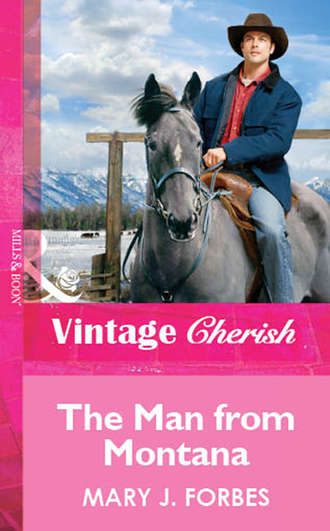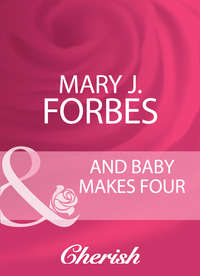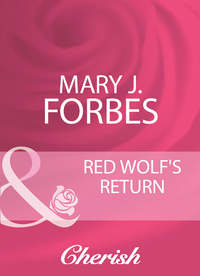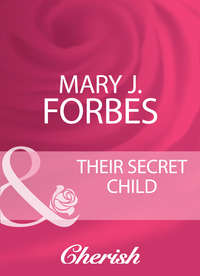
Полная версия
The Man From Montana
Inez, their housekeeper and Tom’s caretaker, was in Sweet Creek at the moment, buying two weeks’ worth of groceries. “We’ll get by,” Ash grumbled. “We always do.” He did not need the Brant woman here, within walking distance, within sight. She was a journalist and he would bet a nosy one, prying until she got a barrel of tidbits to create a stir with her words. “Stories,” they called those reports. He knew why. More fiction than fact.
And with her working at the Times, talking to publisher–owner Shaw Hanson Jr…. Hell, Hanson probably sent her to the Flying Bar T as a dig on the McKees. After all, Ash had gone after Hanson for sending Marty Philips to sniff out that mad-cow scare. Two days following Susie’s death because of that cocky young kid, Ash walked into the newspaper and kicked ass.
And where did that get you, Ash?
Tossed in the hoosegow for three days.
Tom buttered six additional slices, cut another two tomatoes, assembling enough for a soup kitchen. “You said Daisy was in a snit over a couple things. What’s the other thing?”
“Social studies project.”
Across the counter, his stepfather eyed Ash under a line of bushy gray brows. “You wanted it done yesterday.”
“No. I don’t want her bugging you.”
That narrowed Tom’s eyes. “Me?”
“She’s supposed to interview a vet for war facts.”
“Huh. Don’t they have textbooks for that?”
“They do, but this time the kids are supposed to get it from the horse’s mouth. So to speak.”
“Well, this old horse ain’t talking.” The chair hummed as Tom wheeled around to the range. “Same reason you don’t talk about Susie,” he muttered.
Same reason? Hell, there were things Ash would never share with his family. Like the day he’d buried Susie. How he’d gone back at dusk and sat where he’d put her ashes and cried until he puked. How he pounded his fists against the sun-dried earth, cussing that she’d known better than to drive after drinking, a fact he found out from the coroner four days later.
Alcohol at three in the afternoon.
Alcohol affecting her competence.
No seat belt. Busted windshield. Busted brain.
God help him, but Susie’s disregard was his secret. Not Tom’s, and never, never Daisy’s.
His pain. His business. Like Tom with Nam.
Ash pushed away from the counter. Patting the old man’s shoulder, he said, “I’ll tell Daiz to wash up.”
At her computer in the cramped newsroom of the Rocky Times, Rachel put her face into her hands and took a long, deep breath. Yesterday she had gone about it wrong, driving out to the Flying Bar T, trying to get past Ash McKee and his warhorse.
God, when she thought of the rancher and that animal… They exuded a beauty and authority that kept her enthralled for twenty-four hours. McKee’s pole-erect back, his muscular thighs controlling the animal whose charcoal forelock shrouded its eyes. The man himself blocking the sunlit sky with his mountain-wide shoulders, his Stetson.
She rose and went to the window beside her desk, drew up the dusty blinds, welcoming the sunlight. Shaw had swept the sidewalk clear of snow. On this last day of January, the sky promoted a bank of gray snow clouds to the north, which meant that before midnight February would be whistling its way over the landscape.
Several pickups drove down Cardinal Avenue, their wheels churning the previous night’s snowfall into a crusted brown blend. Across the street, a two-tone green crew-cab angle-parked in front of Toole’s Ranch Supplies.
Ash McKee stepped down into the crystalized mush. As he closed the door of his vehicle, his gaze collided with hers across the street. Rachel drew a sharp breath. Again, she saw him on that sweat-flanked horse, smelled the steamy hide of animal, the leather of the saddle as the rancher leaned down toward her….
He turned and disappeared inside Toole’s.
Ash. Here in town. Tom, alone on the ranch.
Rachel snatched up the phone on her desk. In the face of what she wanted, Ash McKee was a massive problem. Local lore, gleaned at Old Joe’s Bakery and Darby’s coffee shop down the street, said he was not a man to take lightly. And when did that stop you, Rachel? You’ve met men far more daunting than this one. Case in point, your father and Floyd Stephens.
This was her chance. Phone Tom while his son was twenty miles away, talk to the old soldier about the guesthouse first, give him a reason to speak with her. Later, she could bring up the story.
“At all costs, get the story.” Her father’s mantra.
Nerves and guilt lifted the hair on her nape. Don’t think. Do. Her fingers shook, but she punched the number without stumbling. At the other end the phone rang twice, three times, six times.
“Come on, pick up or at least get an answering machine.”
Eight rings… “’Lo.”
“Mr. McKee?”
“Yeah?”
“My name is Rachel Brant.” She glanced toward the window. No Ash. “I was out your way yesterday to see you, but—” she couldn’t stop the edgy chuckle “—your cattle were in the way, so I wasn’t able to—”
“You the reporter?”
“I, uh—yes, that’s right. I work at the Rocky Times.”
Silence.
“I’d like to talk to you, sir, if you have a moment.”
“You’re looking to rent the cottage.”
So Ash had relayed the information. “If possible.”
“Ain’t my deal. It’s Ash’s. Convince him and you’ll have a place to hang your hat.”
“I thought you owned the ranch.”
“I do. But the cottage is his venture.”
“Actually, I’d like to talk to you, too.”
“Like I said the cottage is—”
“I know, Ash’s business. But I’d like to talk to you about something else.”
Pause. “This got to do with some damned story?”
“In a way, yes, it does. I—”
Dial tone. He’d hung up. Damn. Now what? Should she phone back? Go out anyway while Ash was in town? No, she couldn’t trust how long he’d be. The last thing she needed was to get caught out in the boonies with a fire-breathing dragon on her heels.
She should have left it with renting the guesthouse, waited until she was out there to talk to Tom face-to-face.
She sat and fumed at her desk. Almost two weeks of planning gone down the drain. Two weeks of schmoozing with the townsfolk, getting to know them on a first-name basis, cracking smiles she didn’t feel, pushing her little boy into yet another school with strange kids. Living in a moth-eaten motel.
All for what? Fame and glory?
So her father—an editor with the Washington Post—would recognize she was as capable of meritorious reporting as her mother had been? Qualified to make the big leagues, to one day write her way to a possible Pulitzer?
Worth loving just a little?
The thought left a barb. Bill Brant had loved no one but his long-dead wife, Grace. Times like these, Rachel wished, wished her mother still lived. But she had died of cancer twenty-four years ago, on Rachel’s eighth birthday. A day branded in her mind. Not only had she lost her mother forever, but her daddy had set the blame at his daughter’s feet. Stupid, Rachel knew. But still.
She had to try. Had to. For her own sake as well as her father’s.
But, oh, she was tired. Of the lying, the pushing, the shoving. Of living in seven different backwater towns in seven states, soliciting local newspapers for a job—just so she could have the time to gain the trust of their wary resident Hells Field veteran. God, what she wouldn’t give to find her own niche and have Bill Brant be happy for her. Just once.
“You don’t give up, do you?”
She jerked around. Ashford McKee stood five feet away, big and tough as the land he owned. A pine and forest man.
Hands buried in a sheepskin jacket, Stetson pulled low as always, he stared down at her with dark, unfriendly eyes. Slowly he removed a cell phone from his pocket and lifted one smooth black brow. “We McKee’s keep in touch.”
She should have known. A fly speck couldn’t get past him without that speck becoming a mountain.
Rachel rose. At five-ten, she was no slouch, but beside him she felt gnome short. “I’m sorry,” she said, “but as I mentioned yesterday my issue is with your father—who I understand owns the Flying Bar T?”
Annoyance flickered in those dark eyes, then vanished. “Issue? The only issue I see here is you—harassing my family.”
“Making one phone call is hardly harassment, Mr. McKee.”
He studied her a moment with eyes that might have offered warmth because of their clear-tea color. Not today. Today they were frozen as the earth outside. “What do you want with him?”
“To ask about the guesthouse.” She pinched back her guilt at the omission of the story.
“And he told you to talk to me. What else?”
On a sustaining breath, she said, “I’m writing a freelance series about Vietnam’s Hells Field.” She let that settle. His eyes remained steady, unreadable. She pressed on, “I’ve been working on the story for several years. Your father is the last of seven surviving veterans and the key to the series. I’d like—” she swallowed when McKee’s eyes narrowed “—a chance to talk to him. Please.”
“Why? There’ve been three decades and two wars in the interim.”
“Because in an already controversial war, Hells Field was a battle that was undisclosed.”
His pupils pinpricked. He understood. A battle fought, facts swept by the wayside, one soldier the fall guy.
“Leave him alone, Ms. Brant.”
“I can’t. At least not until he tells me no.”
McKee stepped into her space. Crowding her. She smelled his skin and the soap he’d washed with this morning. And hay, a whiff of hay. “We don’t need old war wounds opened. Go back to reporting the weekly news.”
“Look,” she said, desperate. “You can read what I’ve written about the other vets so far. I’m a good reporter.”
His jaw remained inflexible. “Tom doesn’t want you hanging around him any more than I do.”
Except, the heat in those dark eyes when they settled on her mouth indicated differently. A zing shot through her belly.
“I understand,” she said slowly. And she did. Newspeople were too often an unwelcome lot. “You don’t like reporters.”
She turned back to her desk. Dismissing him, dismissing the entire conversation, her entire mission. God, why was she so needy when it came to pleasing her dad—oh, face it—when it came to men in general? Men like foreign correspondent Floyd Stephens, pontificating how a kid—his son!—would dump her career in the toilet. Men, valuing her according to some parameter.
Rats, all of them. Shuffling several pages of notes, she muttered, “If I had somewhere else to go I would.”
Which was, in itself, a paradox. If it hadn’t been for her need to make her father proud, to prove to him—and all men for that matter, maybe even to herself—that she was a capable and creditable career woman, she would not be in these sticks.
She would not be begging Ash McKee to understand.
A movement from behind reeled her around. He still stood by her cubicle.
“I thought you’d left,” she said, vexed. Why didn’t he just go?
Under the hat, his tea eyes were pekoe dark. “Where are you staying?”
A tiny hope-flame. “The Dream On Motel.” She thought of Charlie sleeping in that dingy room, the lumpy bed, inhaling smoke-stagnated air into his young lungs. When it came right down to it, his welfare was more important than any story. God, she should just get out of this town and go back to Arizona. At least there it was warm and Charlie had a little friend.
She pushed a wing of hair behind her ear. “I have a child, Mr. McKee. A boy. That’s why I need a place. Somewhere clean and—and welcoming. I know,” she rushed on, “you said I’m not welcome on the Flying Bar T, but you won’t know I’m there. I won’t come near your house without permission. And if your father doesn’t want the interview, that’s fine. Scout’s honor.”
She hated pleading with him, this man with his invisible iron wall surrounding his people.
“How old is he?”
“My son? Seven.”
Again, those unyielding eyes. “I’ll talk to Tom.”
She couldn’t help sagging against her desk. “Thank you. Thank you so much. You won’t be sorry.”
He didn’t answer. Simply looked at her. Into her. Through her. Then turned and strode from the newsroom, out the squeaky door, into the street.
Chapter Two
Ash jaywalked to his truck. A light snow had begun to fall again, fat flakes that caught on his hat and shoulders.
What the hell happened back there in that newspaper office?
How could he even consider renting the cottage to her? She with the fine-boned cheeks that he damn near touched when she looked up at him with those cat eyes.
He climbed into the pickup, backed from the parking slot and drove out of town.
Of course, the kid had done it. Picturing her boy—with her July-blue eyes and burnt-brown hair, probably minus a front tooth—in that dump of a motel where Ash had sown his oats at eighteen, splintered the stone around his heart.
Why hadn’t she told him about the boy before? Was she using him to get closer to Tom? No, her eyes when she mentioned the boy’s name said different.
She loved her kid. The way he loved Daisy.
Shoving a hand through his hair, Ash sighed. Sucker, that’s what he was. Sucker for kids with sad stories.
He’d been one himself once. He and his sister, Meggie, living in that ramshackle house on the edge of town, their mom trying to put bread on the table and decent clothes on their backs. Until Tom entered their lives. Tom, changing lives with the Flying Bar T.
Ash had to give Rachel credit. She’d woven herself right under his skin in five blasted minutes, persuaded him to let her rent Susie’s cottage. Oh, the bit about talking to Tom was only a formality. He knew it, she knew it.
Hell. Here he was, managing nine hundred head of Black Angus and fifty-five hundred acres of land and he’d been bamboozled by a woman—and a seven-year-old kid he had yet to meet.
She’d been daydreaming about him striding across the street with snow on his big shoulders when her desk phone rang the next morning.
“Rachel?” His voice rumbled in her ear.
Her breath stopped. The way he said her name… “Yes?”
“You want to look at the cottage, it’ll be open Sunday.”
In two days. “Thank you for letting me know, Ash.”
“Welcome. What time?”
A civil conversation. “Can I come in the morning, say, ten?”
“See you then.” The phone clicked.
For the first time in forty-eight hours, she smiled. McKee hang-ups were becoming a tradition.
At nine-thirty on Sunday, she drove out with Charlie strapped into the backseat and hope in her heart. Snow continued to fall in intervals, spit flakes on a brisk, cold wind the wipers scraped up in narrow, inch-high drifts on each side of the windshield.
Ahead, the road lay in stainless splendor while behind, the car left a single pair of tracks. Beyond the barbed wire fences, field and hill faded to a duvet of white.
She’d be seeing him again. Ash McKee. You’re not there for him, Rachel. It’s the guesthouse, remember? And Tom.
Still, her heart quickened. She had to admit Ash was an attractive man—in a cowboy sort of way.
“Are we there yet?” Charlie fisted fog off his window.
“Five minutes, honey bun. After the turn ahead, we’ll be there.”
He sat straighter, trying to peer over the passenger seat, his eyes round blue discs behind his glasses. “I can’t see.”
“Trust me, it isn’t far. Warm enough back there?”
“Uh-huh.” He settled back and began vrooming his red Hot Wheels Corvette across his little thighs. The car had been one of her presents on his sixth birthday and his favorite, it seemed. Rarely did the toy escape his sight. Her little man, no different than most little boys his age and no different than an adult male salivating over the real machine.
You lost out, Floyd. You lost out when you walked away from our baby.
“Are we going to be living on a ranch with horses and cows and stuff?” Charlie asked.
“If Mr. McKee will rent his guesthouse to us.”
“I don’t like living in that motel. It stinks.”
“Can’t agree with you more, champ. Let’s keep our fingers crossed that Mr. Ash will say yes.”
More vrooming. “Is he the guy for your soldier story?”
She glanced into the rearview mirror. “His daddy is. Which might cause a problem when it comes to renting from him.”
“Why?”
“Because Mr. Tom might not want me on his property when he finds out I also want to interview him.”
Another quarter mile passed. Charlie vroomed, then said, “Maybe he has nightmares about wars like Grandpa.”
Her jaw fell. “How do you know that?” Bill Brant would die before he admitted any weakness to his daughter.
“Sometimes he sleeps in the chair. Y’know that one that goes back like a bed? And once he started hollering about killing somebody. I think the guy had a gun.”
“That doesn’t mean he was dreaming about war, Charlie. Sometimes people dream about violence.”
“I asked him when he got awake. I asked him what a gook was.”
She cringed at the ancient epithet. “Son, that’s a very unkind word. Did Grandpa explain it to you?” Unbelievable.
“Well, kinda. And then he said I shouldn’t make up stories.”
She squinted into the mirror. “Were you?”
A hard head shake. “Grandpa was snoring, then he started yelling. And making faces like he was hurt or something.”
She kept her hands steady on the wheel. “When was that?”
“Last time we went to visit in the summer.”
Last August. They’d traveled to the coast of Maryland and stayed in the vacation cottage her father purchased fifteen years ago. Rachel loved the ocean—its smells and sounds, how the salt breeze tasted.
“Is that the only time he talked in his sleep?” She slowed for the last turn as the Flying Bar T came into view—and fancied Ash McKee thundering up the road on his Crusader steed.
“Uh-huh. He never slept in the chair again.”
Of course he wouldn’t. Not with an alert, intelligent little boy within hearing distance.
The weathered two-story Craftsman home she’d glimpsed over the backs of the cattle last Wednesday now loomed through the snow.
Driving closer, she noticed the house inhabited a timbered horseshoe with the corrals and outbuildings, including three massive barns, scattered several hundred yards westward. Today’s snowfall hid the Rockies from sight, but four days ago their great, hulking, cotton-capped shoulders were cloaked in a mantle of blue sky.
Ash McKee lived amidst poster-inspiring beauty.
Not Ash. Tom. She was here for Tom. And Charlie.
The black-and-white herding dogs rushed out from under the porch as she pulled up beside the green pickup Ash drove to town.
“Will they bite, Mom?” Charlie’s voice trembled.
“I don’t think so. They’re border collies and like to herd sheep and cows. They’re not mean.” She hoped. But who knew how Ash McKee trained his animals? The warhorse had ground at its bridle bit with long, strong teeth.
She shut off the car, grabbed her purse. Today she simply wanted introductions. No note taking. No pushy reporter manners. Just smiles and a possible welcome to rent.
“Come on. Let’s see if Mr. McKee is home.”
Snowflakes speckled her wool coat and Charlie’s blond hair. Cautious of the dogs, Rachel walked with her son up the steps next to a wheelchair ramp. The animals crept back under the wooden deck. So much for guarding the place. Quite possibly Ash, himself, had the watchdog scenario in hand.
The door swung open. The eager high school columnist and Ash’s companion from last Wednesday offered a smile full of braces. “Hey, Ms. Brant.” She winked when she spotted Charlie.
The boy ducked shyly behind Rachel.
“Hello, Daisy.”
Petite and red-haired, the teenager wore low-rise jeans and a bust-fitting knit top that exposed her navel. If Rachel had a daughter her age, such revealing clothes would not enter her closet. Oh, who was she kidding? Fifteen years ago, she wore tight tops and leggings, much to Bill Brant’s irritation. In the succeeding years, her tastes had tempered to conservatism, like the warm black dress slacks and aqua sweater she’d dug from the motel closet this morning. Bill would label the clothes plain classy, pun intended.
“I’m here to see your dad and your grandfather.”
“I know.” Daisy leaned forward and whispered, “Dad doesn’t know about my column, okay?”
Before Rachel could respond, Ash McKee stepped into the entryway. His dark eyes locked on her, then swept over Charlie. “Bringing reinforcements?”
Without the Stetson, she saw he had beautiful hair. Thick and black and linear and scraped back in a style that pronounced his weather-toughened cheekbones, his long, graceful nose.
“Hello again, Ash.” She set a hand on her child for comfort. “This is my son, Charlie. I couldn’t get a babysitter so he’s with me today.” She tried a smile, failed as those eyes riveted on her face.
Daisy saved the moment. “Dad says you’ll be renting the guest cottage.”
“We haven’t decided yet, Daiz,” Ash interjected, shutting the door behind Rachel.
“But I thought you said—”
“Not yet.” While his eyes gentled on his daughter, his tone was resolute.
“What’s to decide?” she argued.
“So. Our company’s arrived.” A gray-haired, craggy-faced cowboy in a pearl-buttoned shirt rode around a corner in a motorized chair.
Tom McKee. The key to Rachel’s series.
A second, a blink, then his pale blue eyes widened, as if he recognized her, his pupils rounding to the outer edges of their irises before his surprise vanished. Puzzled and certain they had never met, Rachel stepped forward, held out her hand. She was here for the guesthouse.
“Rachel Brant, Mr. McKee. Pleased to meet you.”
“You the one phoned the other day?” he asked, giving her hand a light shake.
“Yes.” A knot formed in her throat at the sight of the strong, brave man. In that instant, she vowed to make him proud with her words.
“What story you digging for, Ms. Brant?”
Her cheeks warmed. “Today, we’re just looking for a place to live, sir.”
The old man stared at her with an intensity that had her shifting on her feet. Then he nodded. “Ash will show you around back of the house.” Decision settled, he glanced at his son, though Rachel knew it wasn’t, not entirely. Not from the line of the younger man’s shoulders beneath that denim shirt. She could have skipped pebbles across them.
“Come with me,” Ash ordered, and left the room without checking to see if she followed.
With a smile for Tom McKee, she and Charlie followed Daisy through the house to the kitchen. The girl murmured, “I’m so glad you’ll be staying here.”
Rachel wanted to ask about the whisper at the front door. About Ash not knowing of Daisy’s column.
They entered a deep kitchen sporting a horde of knotty pine cupboards, an ample work island in its center and a Sub-Zero refrigerator. To the right, a rectangular oak table stood gleaming with light flooding in from floor-to-ceiling windows that faced snowy evergreens. And everywhere, photographs of a red-haired woman. Upon the antique phone table, upon whatever wall space remained unclaimed by cupboards.
Susie, the wife who left Ash McKee widowed.
Without a coat or hat, he waited by a back door sheltered in a small alcove next to the pantry. On his feet, his work boots remained unlaced.
He held open the door as Rachel and Charlie stepped into the cold morning. The wind stung their faces while they followed Ash down a wooden walkway toward a tiny cottage looming thirty yards ahead amidst a snowy stand of pine and birch.
Opening the guesthouse door, Ash waited for her and Charlie to step inside.







